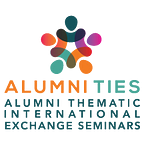Following Taxes to Improve Service Delivery in Nigeria
by Saied Tafida Sulaiman
Most African countries, such as Nigeria, have a long history of concealment in government that creates a culture of obscurity in these countries, making a “fantastically corrupt” system possible. The bureaucrats and the contractors benefit from this opacity to perpetuate their corruption, and the communities suffer from poor service delivery. They deny citizens access to quality public services, such as water and sanitation, health care, and education. Understanding and untangling the complexities of this institutionalized corruption in Africa requires a systematic approach. With the support of an Alumni Thematic International Exchange Seminar (Alumni TIES) small grant, we launched the “Taxes to Improve Service Delivery in Nigeria” program to address these issues. This program is an expansion of my previous Alumni TIES small grant project, “Following Taxes to the Rural Areas of Nigeria and the Republic of Togo.”
The original project started a fiscal transparency education website that enhances social justice in sub-Saharan Africa by promoting tax justice, fiscal transparency, and inclusion. The project grew from an educational website during the past six years to ensure transparency, accountability, inclusion, and citizen participation across the public finance triangle. The website tracked taxation, public budgeting, and public procurement through research, policy, advocacy, practice, monitoring, and evaluation.
In the current expansion of the program, my team and I focused our reach on local and marginalized communities who have less access to the internet across Nigeria using local radio, public policy dialogues, and expert volunteers (EVs) to provide pro-bono services to help communities engage with government effectively. Through the project, we enhanced the capacity of government agencies. We organized civil societies, communities, citizen groups, and youth groups with the proper knowledge to understand taxation, budget, and procurement data by leveraging global platforms like the Open Government Partnership (OGP). The OGP is a multilateral initiative that aims to secure concrete commitments from national and sub-national governments to promote open government, empower citizens, fight corruption, and harness new technologies to strengthen governance. Additionally, the project improved procurement officers’ technical capacity to ensure required data was uploaded appropriately and timely in an acceptable format in the public domain and leveraged widely on listenership radio. The engagement on social media platforms also improved our project’s reach to excluded communities and marginalized groups. Furthermore, the program aimed to rebrand FollowTaxes and Transparency and Accountability in Totality Initiative’s online presence and better position it for effective engagement across Nigeria and the African continent.
“Taxes to Improve Service Delivery in Nigeria” was conducted in three states, Taraba, Nasarawa, and Katsina, and included advocacy visits to senior government officials, traditional rulers, and other civil society leaders. The visits followed a series of capacity-building training sessions for senior government officials, procurement officers, lower government officials on the first day, civil society and business membership organizations and other coalitions on the second day, and local minority communities on the third final day. The sessions centered on state fiscal transparency, accountability and sustainability (SFTAS), open government partnership (OGP), open contracting data standards (OCDS), advanced equitable taxation, internally generated revenue, participatory and community-driven budgeting, and practical community engagement.
In tandem with the capacity building sessions, our project team continued citizen outreach and engagement through community radio in the target Nigerian states to increase broader social inclusion in the discussion. The community radio programs indirectly impacted over a million people across Taraba, Nasarawa, and Katsina states.
The impact of this expanded project cannot be minimized as the capacity training sessions addressed the gap of knowledge of government officials by teaching the importance of co-creation with the members of civil society. This continued growth and cooperation between these two groups only show this work’s extensive future impact and necessity.
Taxes to Improve Service Delivery in Nigeria is funded through an Alumni TIES small grant from the U.S. Department of State.
